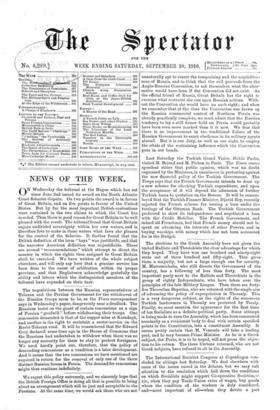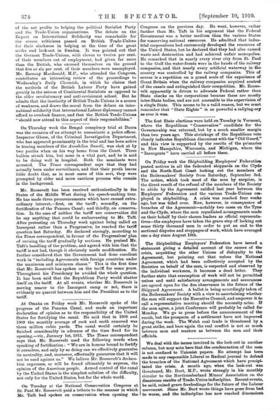The International Socialist Congress at Copenhagen con- cluded its sittings
last Saturday. We deal elsewhere with some of the issues raised in the debates, but we may call attention to the resolution which laid down the conditions on which Socialists might support Co-operative Societies,— viz., when they pay Trade-Union rates of wages, buy goods where the condition of the workers is duly considered, and—most important of all—when they devote a part
of the net profits to helping the political Socialist Party and the Trade-Union organisations. The debate on the Report on International Solidarity was remarkable for the severe criticisms passed on British Tra.de-UniOns for their slackness in helping at the time of the great strike and lock-out in Sweden. It was pointed out that the German Trade-Unions, with eleven to twelve per cent. of their members out of employment, had given far more than the British, who excused themselves on the ground that five or six per cent. of their members were unemployed. Mr. Ramsay Macdonald, M.P., who attended the Congress, contributes an interesting review of the proceedings to Wednesday's Daily Chronicle, in which he claims that the methods of the British Labour Party have gained greatly in the esteem of Continental Socialists as opposed to the older revolutionary and anti-revisionist school. But be admits that the insularity of British Trade-Unions is a source of weakness, and draws the moral from the debate on inter- national solidarity that international Labour diplomacy cannot afford to overlook finance, and that the British Trade-Unions " should now attend to this aspect of their responsibilities."







































